Key takeaways:
- Adapting to policy changes in the fine dining industry is essential for compliance, guest trust, and operational excellence.
- Keeping informed through reliable sources like government websites, trade associations, and industry publications is crucial for navigating regulations.
- Engaging with industry networks and participating in discussions can unveil valuable insights and foster innovation in restaurant operations.
- Involving the entire team in implementing changes and testing new practices can lead to smoother transitions and improved compliance.
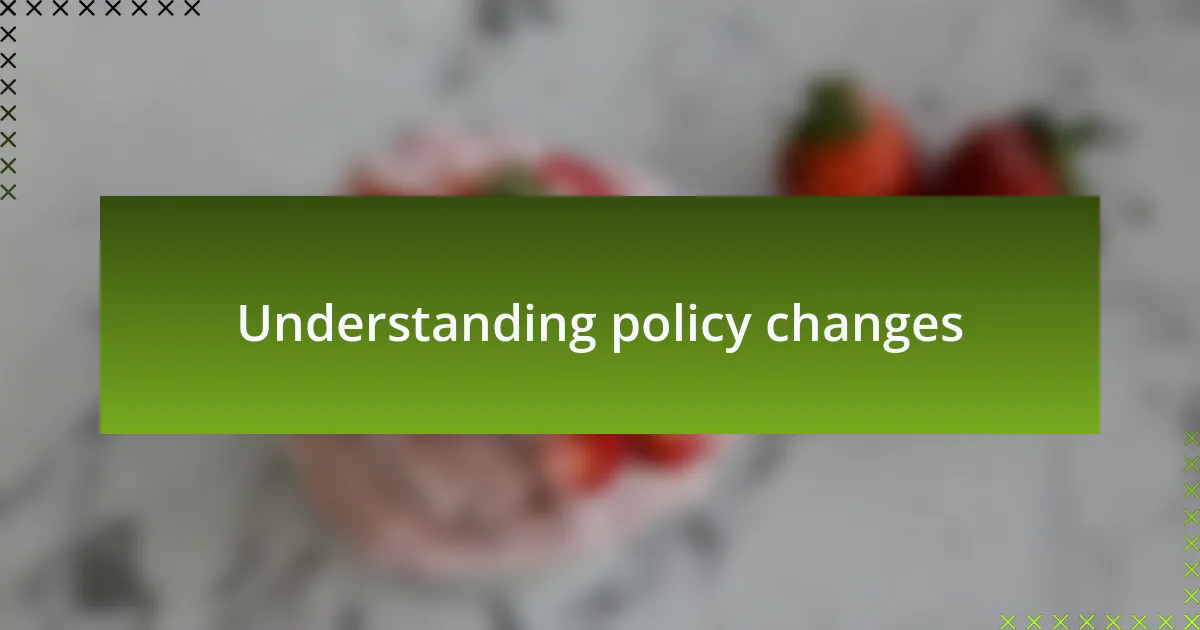
Understanding policy changes
Understanding policy changes is crucial in the fine dining industry, as these shifts can significantly impact operations. I remember a time when a sudden change in health regulations forced our kitchen to adapt on the fly. It made me realize how vital it is to stay alert and responsive to such updates.
I often ponder how these policy changes reflect broader societal values, like the increasing emphasis on sustainability. Have you noticed how guest expectations evolve with these shifts? I find that when a restaurant embraces these updates, it not only enhances compliance but also fosters a deeper trust with clientele.
Moreover, understanding these changes means staying connected with industry networks that share insights and best practices. I once attended a workshop that opened my eyes to potential pitfalls in policy adaptation. Engaging with peers in these discussions has not only been enlightening but has allowed me to navigate these policies with greater confidence.
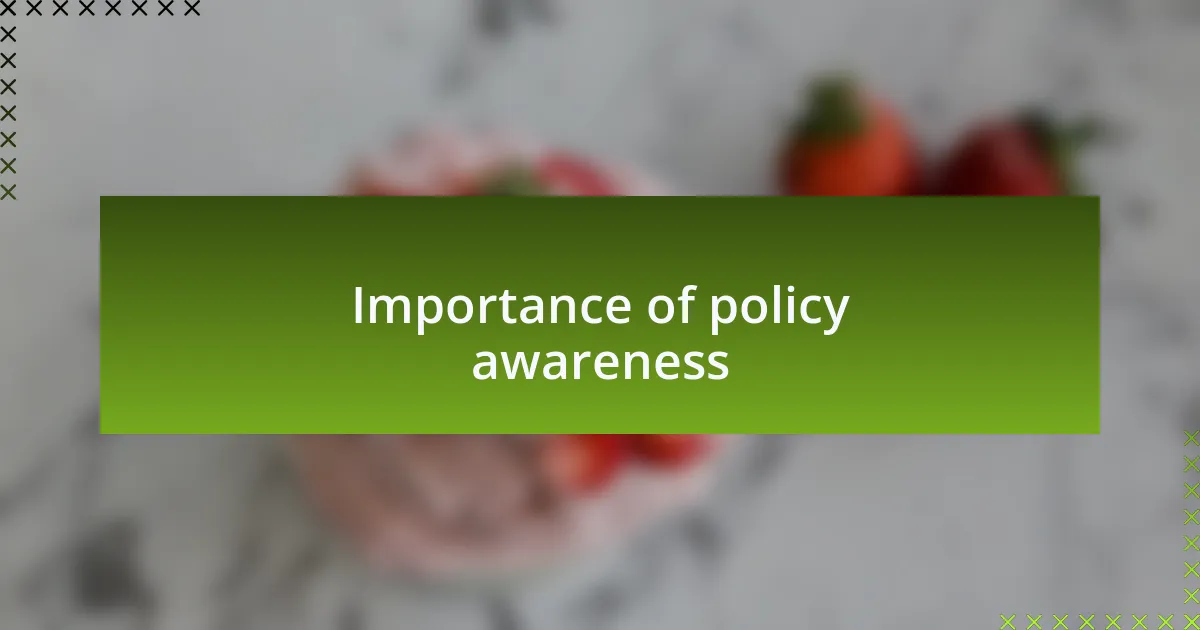
Importance of policy awareness
Staying aware of policy changes is essential—not just for compliance, but for the reputation of the restaurant. I recall receiving a notification about a new allergen labeling law. As a chef, I felt a rush of responsibility to ensure our menus reflected this change accurately. It’s a reminder that our commitment to food safety and guest trust starts before they even step through the door.
When I think about the implications of policy awareness, I can’t help but relate it to the rhythms of the dining experience. Have you ever noticed how a well-informed staff can elevate a guest’s meal? I remember how our front-of-house team turned a potential frustration about a sudden ingredient shortage into an opportunity for engagement. By understanding the current policies, we were able to share genuine stories about our sourcing practices, enhancing the dining experience while staying compliant.
Moreover, being informed about policy changes can spark innovation within the kitchen. For example, when we learned about new waste management regulations, it inspired a revamp of our approach to sustainability. This shift not only aligned us with current practices but also resonated with patrons who value eco-friendliness. This kind of awareness transforms challenges into avenues for improvement, fostering a culture of excellence within the dining experience.
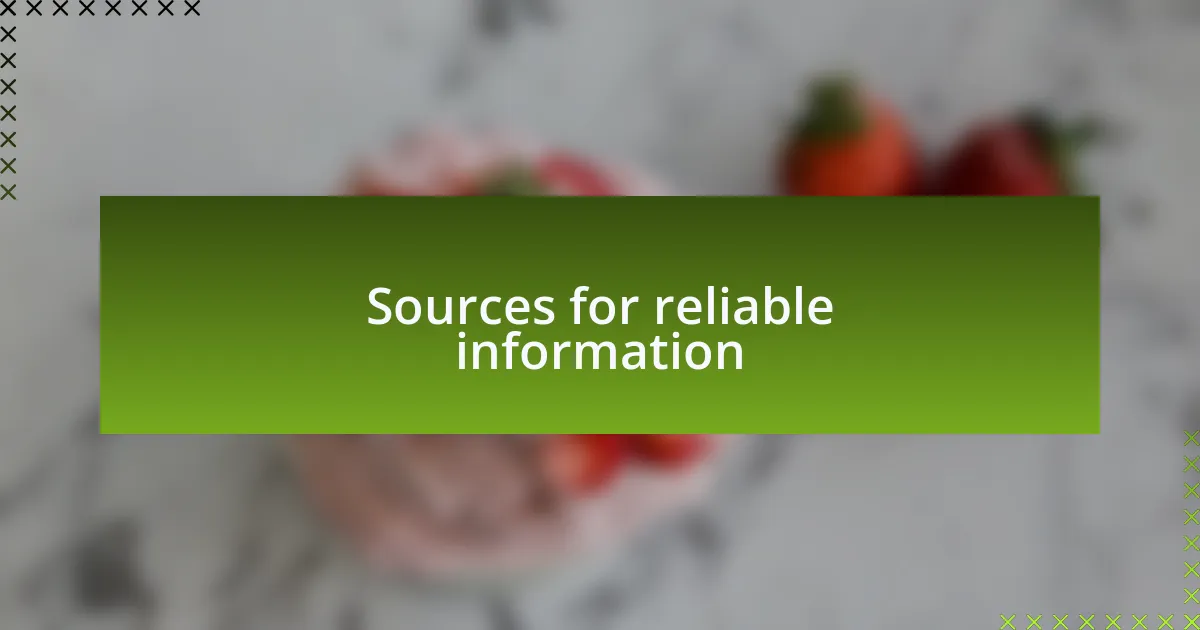
Sources for reliable information
When it comes to finding reliable sources for policy changes, I usually start with government websites. I’ve found that their official pages often provide the most accurate and up-to-date information regarding regulations that can impact our restaurant. For instance, I once stumbled across an updated zoning regulation that could have drastically altered our operating hours if I hadn’t caught it on time.
Trade associations are another valuable resource. Joining one was one of the best decisions I made for my career in fine dining. Not only do they offer newsletters that summarize recent policy changes, but they also host webinars where experts break down complex regulations into understandable segments. This was particularly helpful the time I attended a session on health regulations, which allowed me to engage directly with the policymakers.
Finally, I often turn to reputable industry journals and magazines. These publications not only highlight trends but delve into policy issues that influence our sector. I remember reading an insightful feature about the impact of new labor laws on the hospitality industry. It was a wake-up call that underscored the need for proactive discussions with my team, transforming what could have been a compliance headache into an opportunity for us to elevate our workplace culture.
![]()
Tools for tracking updates
When it comes to keeping track of policy changes, I rely heavily on online alert tools. For example, I’ve set up Google Alerts for specific keywords relevant to my restaurant. It’s fascinating how an automated email can bring timely updates right to my inbox, especially when it’s about crucial local regulations that could affect our dining experience. Have you ever wondered how much you might miss if you weren’t proactive?
Social media also serves as an unexpected yet powerful tool for staying informed. I follow key policymakers and industry leaders on platforms like Twitter and LinkedIn. By engaging with real-time discussions, I’ve been able to pick up nuances about upcoming trends before they’re formally announced. There was this one time a tweet from a local council member hinted at a change in health codes, prompting me to initiate conversations with my staff ahead of time. It really reinforced my belief that sometimes the most significant updates come from the grassroots level.
Lastly, mobile apps dedicated to legislative tracking have become invaluable in my daily routine. I discovered one that allows me to browse and receive updates on policy changes specific to the food and beverage sector. A few months back, I used it to stay ahead of a sudden shift in food safety standards due to recent health concerns. It felt empowering to navigate these changes with confidence, as if I were part of a larger conversation about the future of fine dining. How do you manage to stay updated? Sharing our strategies can lead to even greater insights!
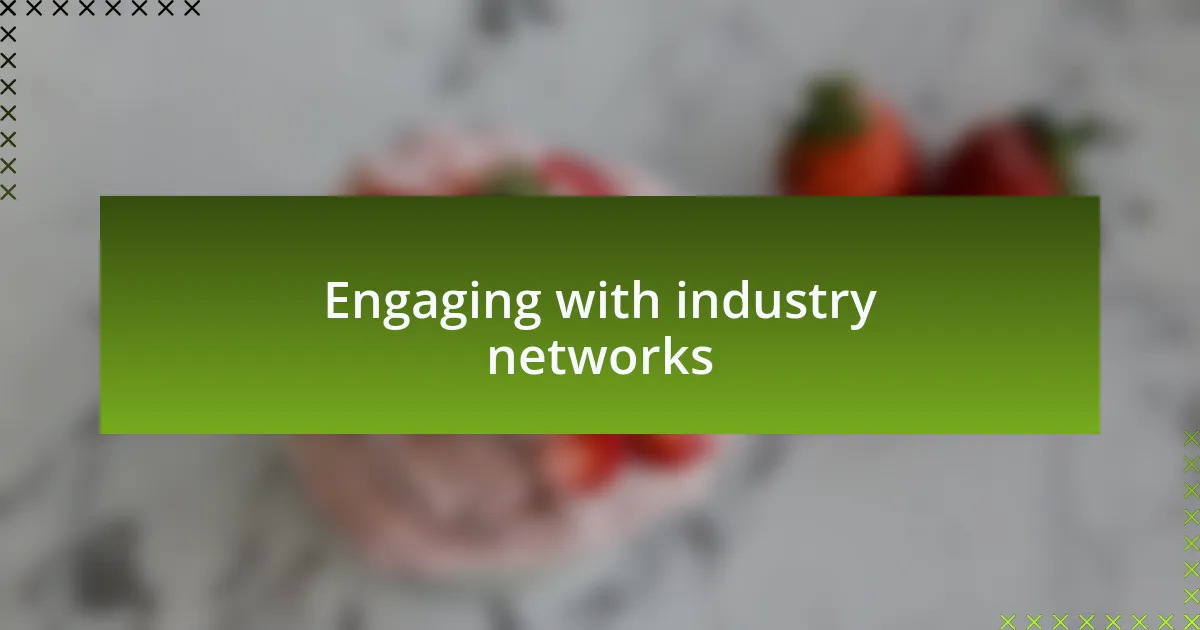
Engaging with industry networks
Engaging with industry networks has truly deepened my understanding of policy changes that affect fine dining. I make it a point to attend local restaurant associations and culinary events. At the last one I attended, I struck up a conversation with a fellow restaurateur who shared insights on recent legislative shifts I hadn’t even heard about yet. Isn’t it amazing how a simple dialogue can unveil knowledge you never knew you were missing?
Moreover, I actively participate in online forums and webinars pertinent to our industry. These digital gatherings often feature guest speakers who are experts in policy-making. I recall a webinar where a food safety inspector discussed upcoming regulations in detail; it was like getting a sneak peek into the future. Have you ever felt that rush of being ahead of the curve? It’s invigorating to know I can apply that knowledge to enhance my restaurant’s operations.
Networking pays off in unexpected ways too. I’ve developed friendships with local journalists who cover the food scene and regularly share their articles with others in the industry. Their insights often highlight policy changes I might not catch on my own. Just last week, one of them shared a deep dive into a proposed tax reform impacting our sector. It’s all about sharing resources; how often do you tap into your network for updates? The collaboration can elevate the whole community’s success.

Personal strategies for staying informed
When it comes to staying informed about policy changes, I find that subscribing to industry publications is a game changer. One day, while flipping through a well-regarded magazine, I stumbled upon an article about impending labor laws that could affect our staffing strategies. It hit me how crucial these publications are in providing timely insights that I might miss otherwise. Have you ever felt that thrill of discovering information just in time to make impactful decisions?
Another approach that works wonders for me is setting up Google Alerts for specific topics related to policy changes in the restaurant sector. Imagine my surprise when I received an alert about a new sustainability initiative aimed at reducing food waste—that very week, I was able to implement practices in my restaurant to align with those standards. It’s like having a personal news assistant, constantly keeping me in the loop. Have you tried using technology to streamline your information-gathering? You might be surprised at how much it helps.
Finally, I make it a point to have regular discussions with my legal and financial advisors. These meetings often become a knowledge-sharing session rather than just a transactional check-in. One of my advisors recently mentioned an upcoming zoning policy that could impact our renovations, and I realized how pivotal those moments are. It’s in these conversations that I not only gather information but also feel supported in navigating the complexities of our industry’s landscape. How often do you leverage your advisors for insights that go beyond the surface?
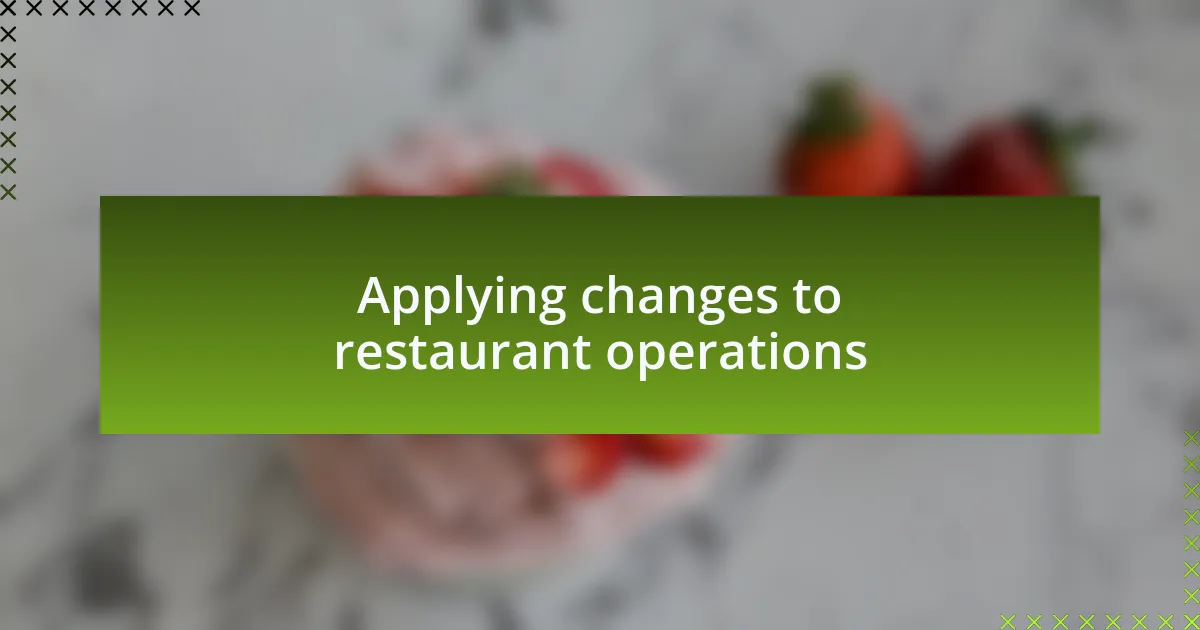
Applying changes to restaurant operations
Applying changes to restaurant operations requires not only awareness of the new policies but also a proactive mindset. I distinctly recall a situation where a sudden health regulation prompted me to revamp our kitchen protocols overnight. It was both daunting and invigorating, knowing that my commitment to excellence meant adapting rapidly while still maintaining our culinary standards. Have you ever faced a similar urgency that pushed you to innovate?
When implementing changes, I believe it’s essential to involve the entire team from the get-go. During a recent staff meeting, I introduced new training sessions focusing on compliance with updated service standards. The enthusiasm from my team was palpable, and I could see how their input crafted a more cohesive strategy for our restaurant. Have you considered how empowering your staff can transform the way your business embraces change?
In my experience, testing changes before a full rollout can save a lot of headaches. I once piloted a revamped menu that incorporated local ingredients to meet new sustainability guidelines. Running a smaller-scale version allowed me to fine-tune recipes based on guest feedback, making the later launch feel seamless. What methods do you use to ensure smooth transitions when policies shift?